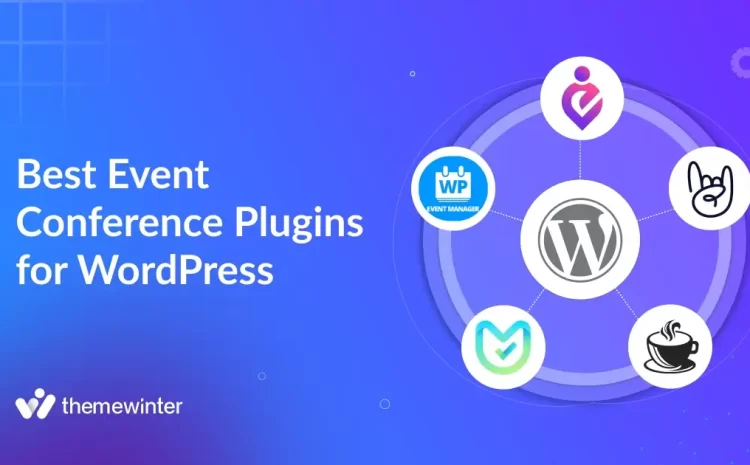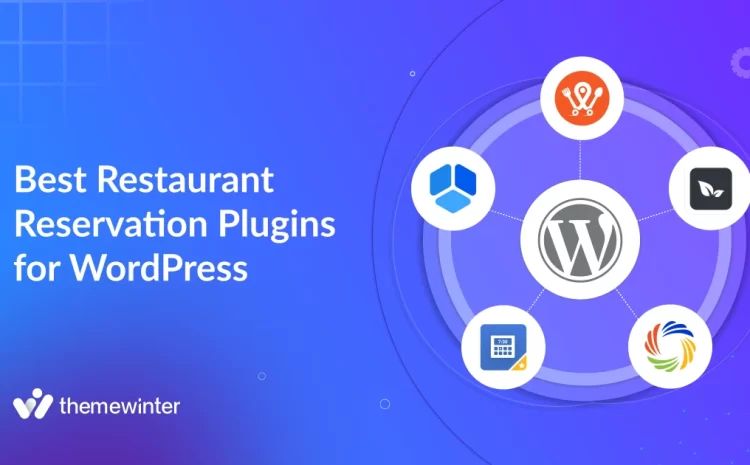Google AI Overviews & Events: How to Format Your Event Page so Google Quotes You
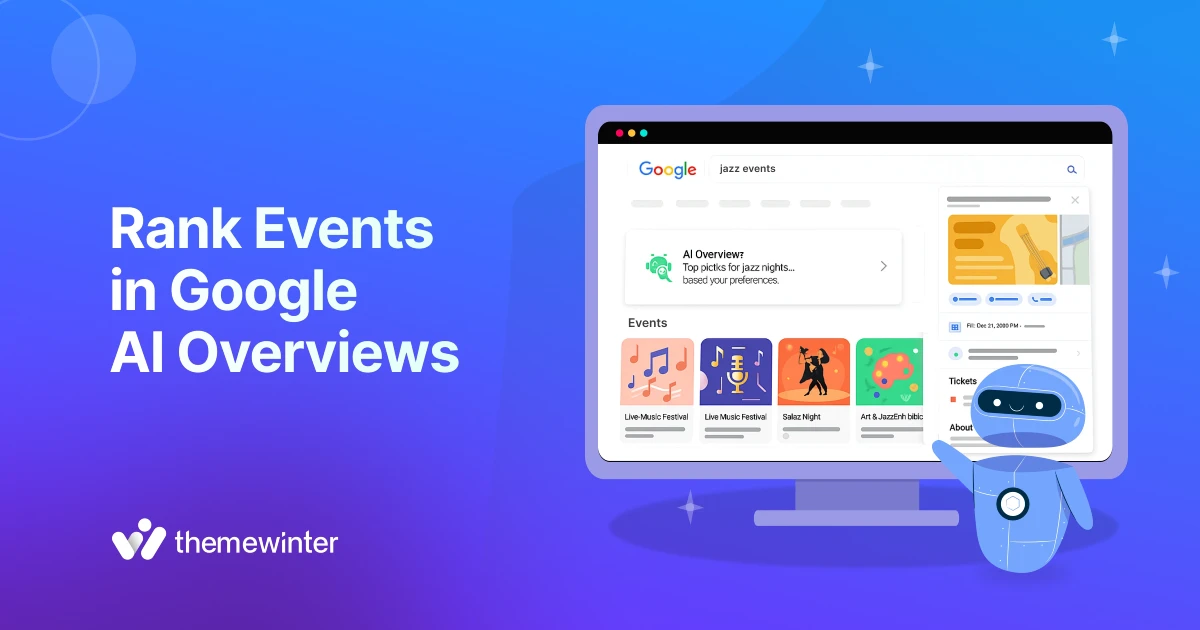
Table of Contents
Google’s new AI Overviews in search results are a game-changer for how people discover information – including events. These AI-generated summaries appear at the top of Google Search results and provide users with a quick, conversational answer from multiple sources.
So, if you do not optimize content for Google AI overview, you lose your audience!
This guide is written for event managers, organizers, digital marketers, and SEO specialists who want their events to show up in Google’s AI Overviews.
Keep reading to learn how to protect your event website from traffic drops in AI search and recover lost traffic..
Quick checklist for ranking an event in Google AI overviews
Before diving deeper, here’s a handy checklist to get you started on making your event pages AI-friendly:
- • Write clear, keyword-rich event titles and descriptions.
- • Add complete, consistent details (date, time, location).
- • Use event schema markup (structured data).
- • Organize content with headings, bullet points, and FAQs (AEO & GEO).
- • Make pages fast-loading and mobile-friendly.
- • Keep content updated and relevant.
- • Link internally from other related pages.
What Google AI overviews mean for event organizers
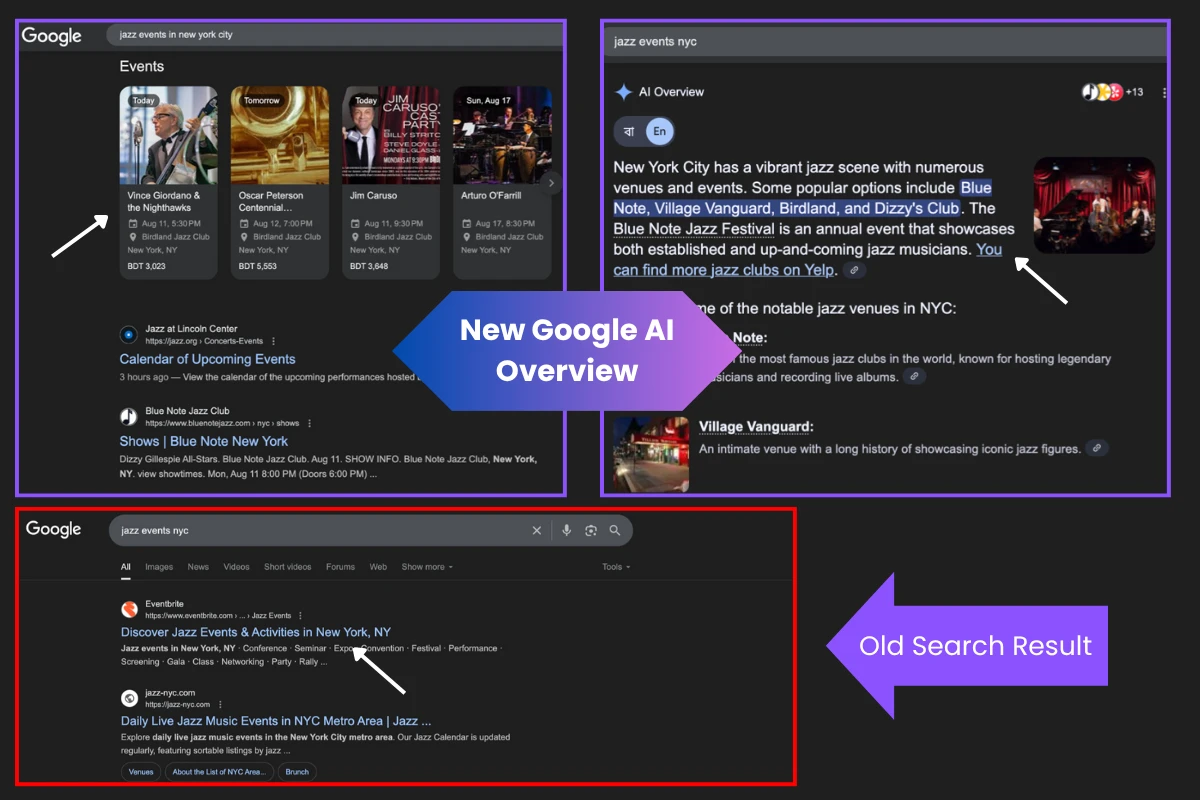
Google’s AI Overviews (part of its Search Generative Experience) represent a new way your event information can appear on the results page – and it’s pretty different from the familiar blue link listings.
Instead of just showing a list of websites, Google’s AI Overview uses generative AI to summarize answers. It may compile details about events from across the web into a concise paragraph at the top of the page .
For example, if someone searches “jazz events in new york city”, the AI Overview might return a brief list or description of a few concerts or festivals with key details, before the user even clicks any website.
For event organizers, this update to Google search changes has two major implications:
1. High visibility for featured events:
If Google’s AI selects your event details as part of its overview, your event gets top-of-page exposure. The AI might mention your event’s name, date, and venue in a natural sentence and include a citation link to your site.
Tips: Being featured in the AI summary can be even better than ranking #1 organically.
2. New competition and context:
On the flip side, AI Overviews blend content from multiple sources. Your event might be listed alongside two or three others in the AI’s answer, even if those are from different websites.
This means your event must stand out, not just in typical search results, but also in an AI summary. If your page isn’t clear, the AI might skip it and choose another event instead.
Before we discuss how to optimize for AI Overviews, let’s look at some common reasons event pages often fail to get featured in these new search results.
Why do event pages struggle to get featured on the Google AI overview?
Not all event pages will show up in Google’s AI-generated summaries. Many event listings don’t appear at all.
Here are some common reasons why event pages might not be featured in AI Overviews or search results:
- Lack of structured data (Event schema not implemented correctly): Without proper schema markup, Google can’t easily extract details like dates or locations, making your page less likely to be summarized.
- Poor design and user experience: Complex layouts or hard-to-navigate event pages confuse both users and AI crawlers, leading to lower rankings.
- Unclear or inconsistent event information: Vague descriptions, mismatched dates across platforms, or missing key details like pricing prevent AI from confidently pulling your data.
- Failure to target specific attendees: Not addressing niche audiences (e.g., “events for marketers”) means your page doesn’t match targeted queries that AI favors.
- Poor mobile experience: With most searches on mobile, slow or unresponsive designs hurt your chances, as Google emphasizes fast, device-friendly sites.
- Lack of social proof: No reviews, testimonials, or attendee counts make your event seem less credible, reducing AI’s trust in featuring it.
- Outdated or incomplete details: Old events or pages without updates signal irrelevance, causing Google to ignore them in favor of fresh content.
Now that we know the pitfalls to avoid, let’s move on to the proactive side: how can you optimize your event pages to get featured in Google’s AI Overviews?
How do you get your event featured in Google AI overviews? (10 expert tips)
Getting your event highlighted by Google’s AI isn’t random luck – you can actively optimize for it. Here are several expert strategies to improve your chances of being featured in AI Overviews.
✅ Note: I also want to introduce you with Eventin Event Manager.
During our market research, we found that while people often know the basic tips for event marketing, but they struggle to find the right event management plugin that brings everything together in one place—especially when it comes to formatting your event page for Google’s overview section.
With this issue in mind, I’ve added small sections under each tip showing how Eventin can help.
👉 These parts are optional — you can skip them if you’d like. But if you’re serious about ranking your event and managing everything seamlessly,they’re worth checking out.
1. Make clear event titles and descriptions
Make sure your event title is descriptive and incorporates what the event is about, along with any key info a searcher might query.
For example, instead of “Spring Gala”, use “Spring Gala Charity Ball 2025 – Downtown LA” if location or purpose is relevant. Similarly, write a concise description that includes important keywords naturally (e.g., genre, audience, cause).
This helps Google match your event to specific searches.
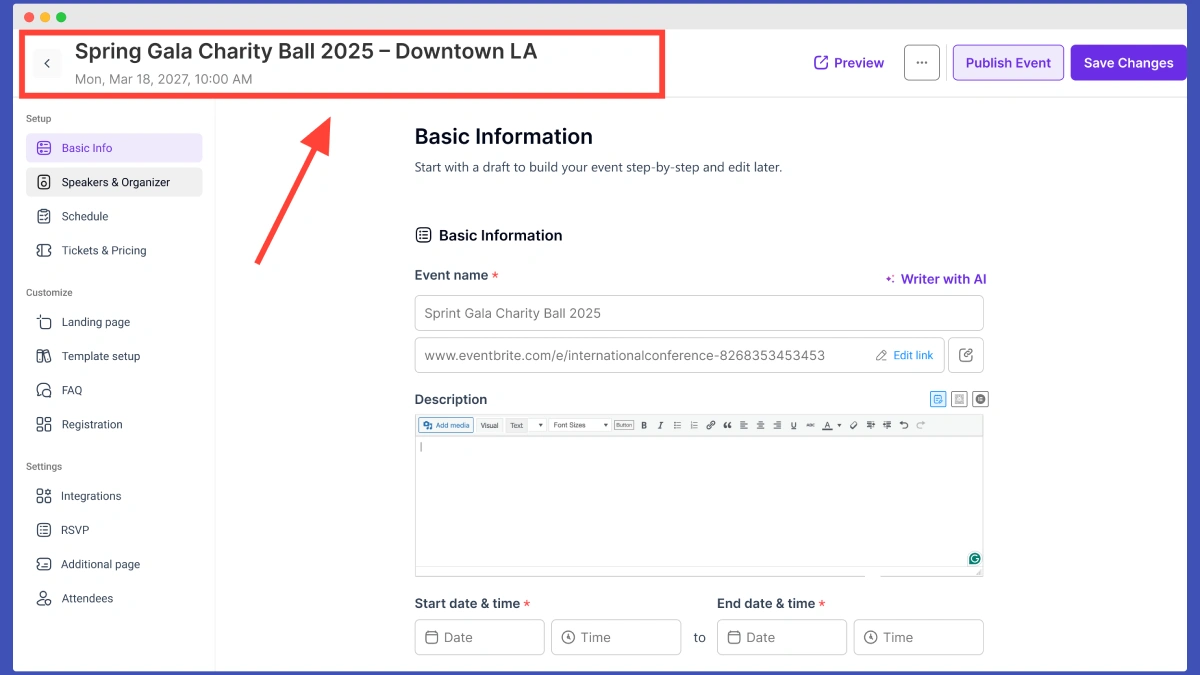
How Eventin helps
If you’re using Eventin, it automatically uses your event name as the page title (which is great for SEO) and lets you add a detailed description in the event post. Eventin’s integration with SEO plugins like Yoast or Rank Math means you can also set a custom SEO title and meta description for the event page.
2. Accurate and consistent event details (date, time, location)
Double-check that every detail about your event is correct and visible in text. Spell out the date and time (with time zone if your event is virtual or audiences are global) and include the full venue address.
Consistency is important – use the same event name, date, etc., everywhere (website, Google Business, Facebook) to avoid confusion. Google’s AI will cross-verify details across sources, so consistency builds confidence.
How Eventin helps
Eventin has dedicated fields for date, time, venue, maps, etc., and it displays them in a standardized format on your event page. This structured layout ensures no detail is accidentally left out. Moreover, Eventin can integrate with Google Maps for location and automatically format dates/times, reducing manual errors.
3. Structure your event content for AI summaries (AEO & GEO)
Structure your event page content in a way that’s easy for an AI to summarize. This means following principles of Answer Engine Optimization (AEO) and Generative Engine Optimization (GEO). Use clear headings for sections like “About the Event”, “Schedule”, “Pricing”, “FAQs”, etc. Break text into short paragraphs or bullet points where appropriate.
Directly answer likely questions in the text.
For example, under a “Who should attend?” heading, you might write “Who is this event for? This conference is ideal for early-stage startup founders looking to network and learn about fundraising.”
Such content not only helps human readers but is good for AI – it’s phrased in a Q&A style and contains the keywords a user might search.
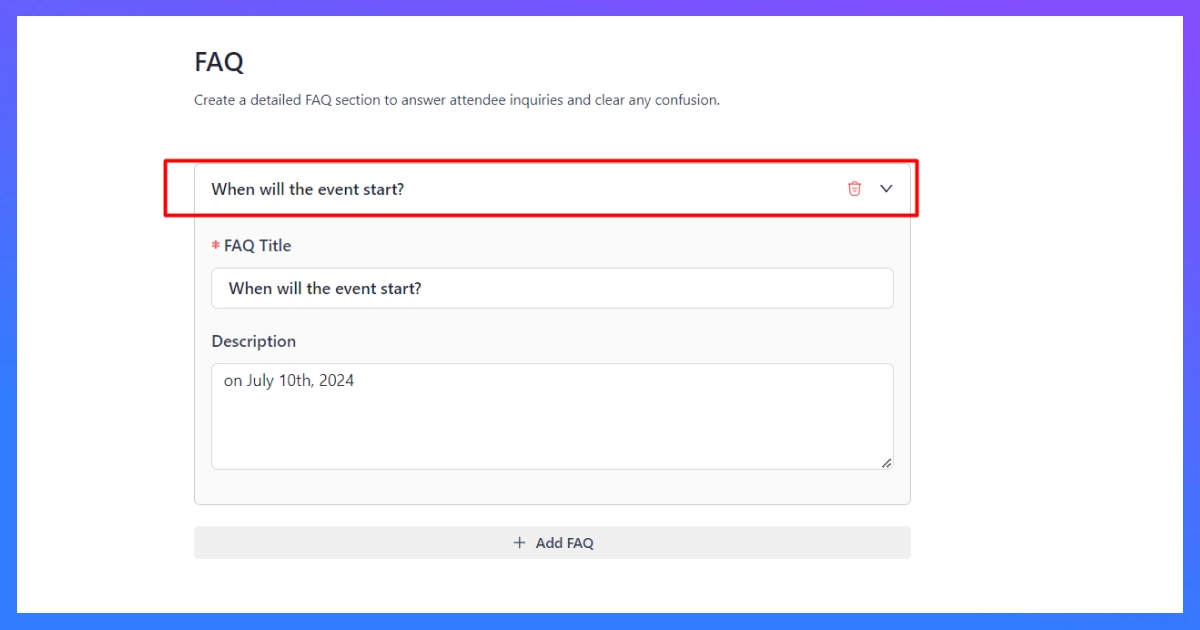
How Eventin helps
Eventin’s event pages are built with a clean, logical structure. The template typically puts the title, date/time, and location at the top, followed by a description, and you can enable tabs or sections for schedule, speakers, etc.
This structured presentation aligns well with AEO practices, because all the info is compartmentalized clearly. Additionally, you can easily add custom content sections or FAQs to your event when using Eventin.
The result — Google can quickly identify question-answer pairs and key details.
4. Optimize the event page for fast-loading and mobile-friendly
Page speed and mobile usability are critical for both SEO and user experience. Google’s AI won’t feature your content if your page barely loads on a phone or takes ages to display.
Use tools like Google PageSpeed Insights to check load times, and make sure your site is responsive. Optimize images, enable caching, and minimize heavy scripts.
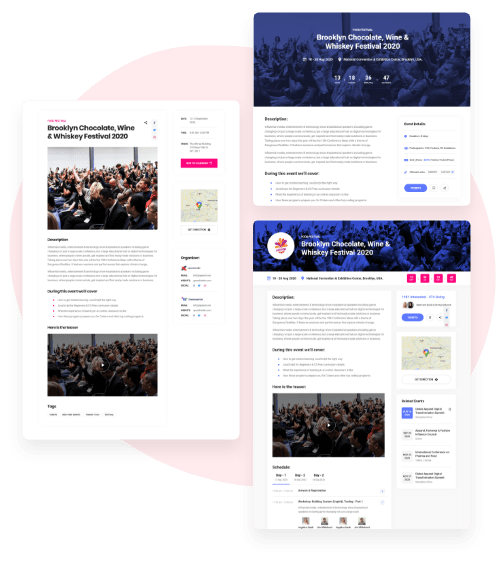
How Eventin helps
Eventin is designed with modern web standards, so its event templates are mobile-responsive and optimized for performance. The plugin’s code is lightweight, and it leverages your WordPress theme’s responsiveness – meaning your event page will automatically adjust to different screen sizes.
Eventin also allows you to disable any features you might not need on a page (like maps or large image galleries) if you find they slow things down. Furthermore, Eventin provides a solid foundation for a speedy, mobile-optimized event page, which is a big plus for ranking in AI-driven results .
6. Add a strong internal link to related event pages
Don’t let your event page be an island. Link it from relevant sections of your site – for example, your “Events” overview page, your blog posts that talk about the event’s topic, or past event pages (if it’s an annual event, link last year’s recap to this year’s page).
Internal links help Google discover your page and also indicate that it’s important on your site. A well-linked page tends to rank better, which in turn can influence whether it’s picked up by the AI overview.
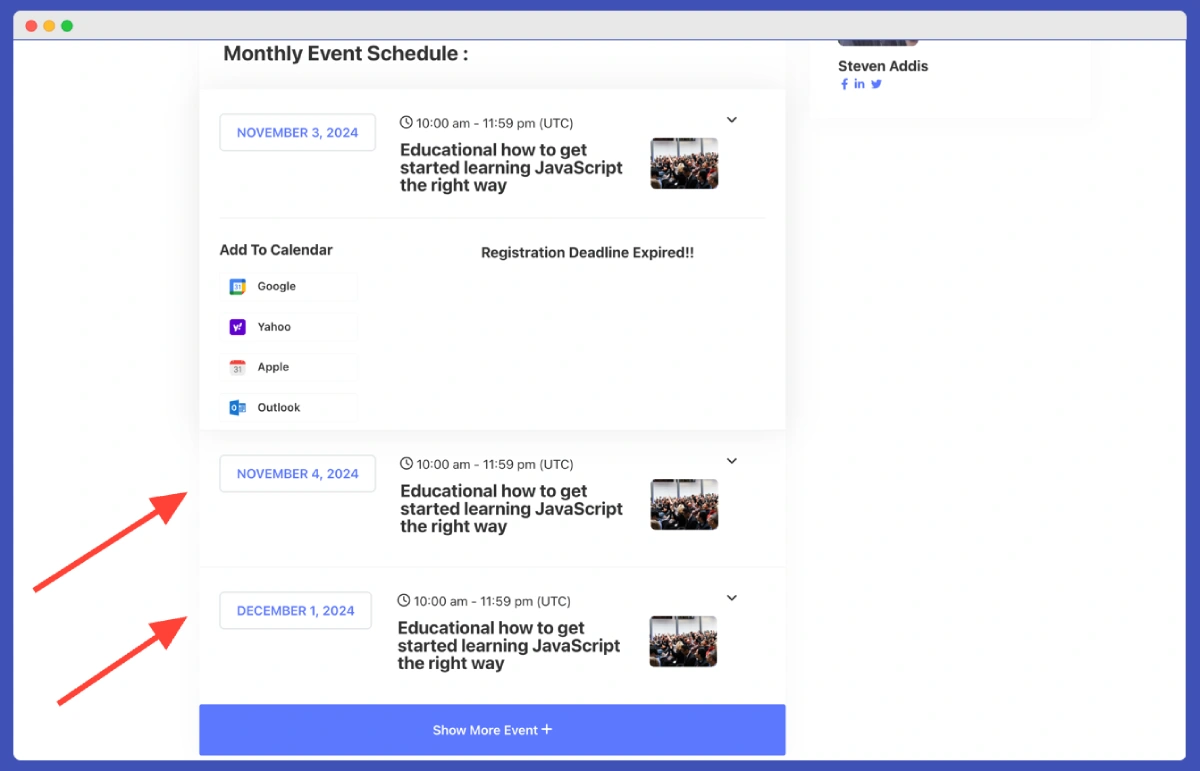
How Eventin helps
Eventin automatically creates structured pathways for internal linking. It provides shortcodes and widgets for event lists, calendars, and archives. For instance, you can have an Upcoming Events widget on your homepage or sidebar – every event listed there links to its detail page, naturally boosting internal link coverage.
Eventin also allows categorization or tagging of events, so you can link between events of the same category. If a user is viewing one event, the plugin can show “Related Events” or other upcoming sessions, which again are internal links.
With Eventin, maintaining a well-linked event section is largely handled by the plugin’s structure, so you reap the SEO benefits with minimal effort.
7. Make related FAQ and Q&A format event content
As mentioned earlier, having an FAQ section on your event page can significantly improve your chances of appearing in AI results and featured answers.
Identify the top 5-10 questions people have about your event (What’s the agenda? Is there parking? Are kids allowed? How to get tickets? etc.) and answer them in a clear, conversational manner.
Use an FAQ schema if possible (many SEO plugins or schema tools can help with this). These FAQs not only target long-tail search queries but also feed Google direct snippets it can use in overviews.
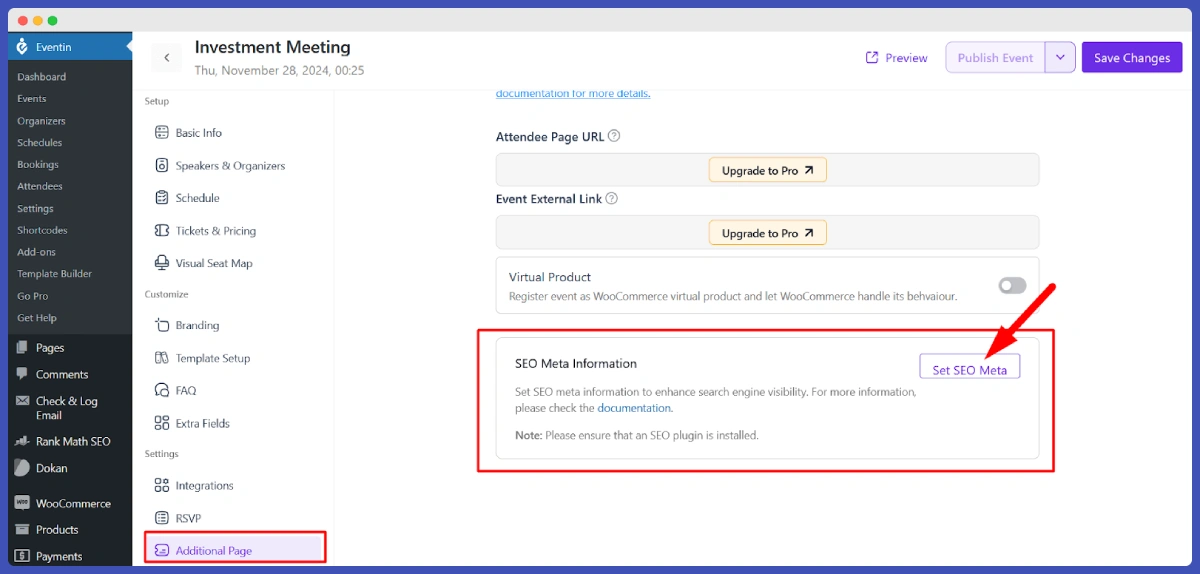
How Eventin helps
While Eventin’s core focus is event management, it provides FAQ support as well. Eventin allows you to add FAQs right on the event page when you create an event. There is a special FAQ section on the event page where you can set up your FAQs.
Additionally, Eventin supports SEO plugins like Yoast and Rank Math; you can easily add an FAQ block (which automatically adds FAQ schema) to your event page content.
8. Keep your Event pages fresh and updated
Google prefers up-to-date content, especially for time-sensitive events. If your event page is updated with the latest information, AI is more likely to trust and show it.
But if your event details are outdated or missing recent, upcoming, or expired events, Google AI may not display your event page in search results or event lists.
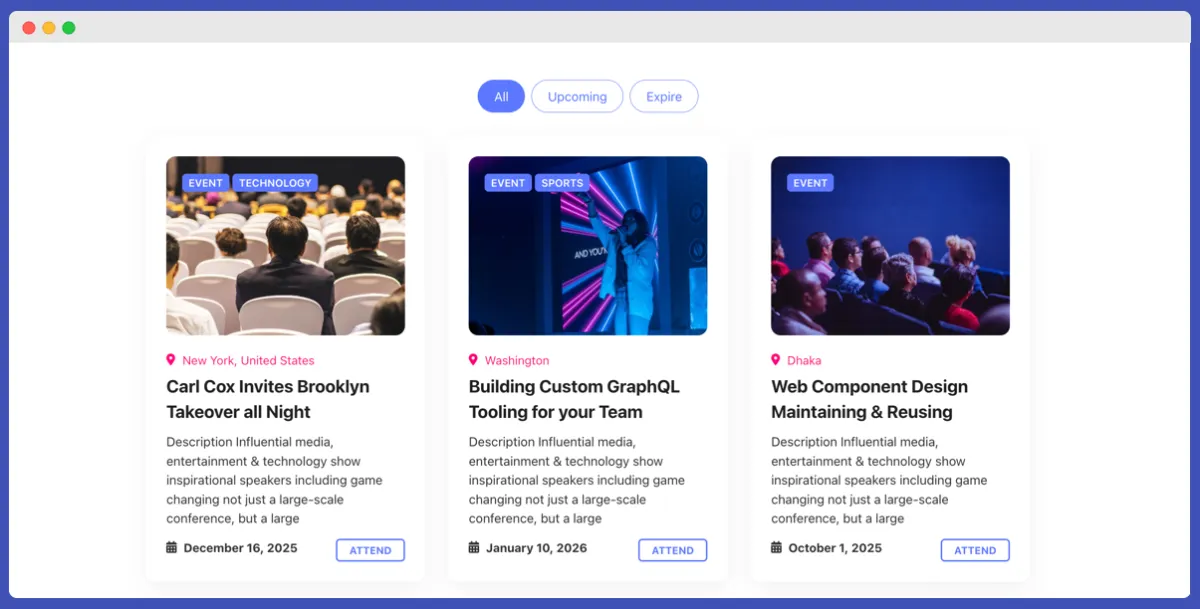
How Eventin helps
Eventin simplifies content updates. It provides a user-friendly dashboard to edit your event details at any time. If the date or venue changes, you just update the event post and it’s reflected everywhere on the page (and in the structured data).
Eventin also has features for recurring events/ multi-session events. Another way Eventin helps is by automatically handling past events – once an event date is over, the plugin can move it to a Past Events list or mark it as expired. This prevents the issue of outdated events lingering unmodified.
9. Use high-quality images and media (with alt text)
While content is king, visuals matter too – for user appeal and for SEO. Include at least one good image related to your event (e.g., the event poster, venue, or past event photo).
Give it a descriptive file name and ALT text (e.g., alt=”Band performing at XYZ Music Festival 2024″) so Google can understand it.
Sometimes, AI Overviews might even show an image thumbnail, and having relevant images could make your snippet more eye-catching. Videos can also be useful (say, a promo clip or an invite from the organizer) – just ensure they don’t slow the page down.
How Eventin helps
Eventin allows you to add featured images and image galleries to your event pages easily. These images are displayed in a responsive way and you can add captions or alt text via WordPress media library.
Just remember to add informative alt text when you upload them. This way, your event page not only reads well to AI, but also looks appealing to users, increasing engagement.
10. Promote externally and earn backlinks
Lastly, don’t ignore off-page SEO. If your event is notable, try to get it listed on other sites too – local event directories, industry forums, community calendars, or news sites.
When the AI sees multiple reputable sources talking about your event, it reinforces that it’s an event worth mentioning. Plus, traditional SEO still counts: having quality backlinks to your event page will improve its ranking.
While backlinks alone won’t guarantee an AI mention, they are part of the overall authority signal of your site.
How Eventin helps
Eventin can generate calendar feeds or allow you to export/import event details, which you can use to share your event to platforms like Google Calendar, Facebook Events, etc.
Also, suppose you have an email list or social media. In that case, Eventin provides embeddable links and webhook that make sharing easier – the more people talk about and link to your event, the better.
Final words
Google’s AI Overviews and the Search Generative Experience are changing how people find events online. It might feel like the AI is in control — but this change is your chance to get your event in front of more eyes than ever.
The steps in this guide will help you create event pages that Google’s AI can understand, trust, and feature. That means more visibility, more clicks, and more attendees.
And here’s the best part — you don’t have to do it all manually. Eventin makes it easy to add event schema, keep your details accurate, structure your content, and deliver a fast, mobile-ready page. It’s like having an SEO expert built into your event management system, working behind the scenes to get your event ranked in Google’s AI overview search.
FAQs
1. How do I get my event featured in Google AI Overviews?
Use event schema, clear and keyword-rich titles, accurate details, and a structured layout. Keep your page updated so Google’s AI sees it as fresh and reliable.
2. What is event schema and why is it important?
Event schema is structured data that tells Google exactly what your event is about. It helps search engines display your event details correctly in AI Overviews and rich results.
3. Does mobile optimization affect AI Overview rankings?
Yes. Google prefers fast-loading, mobile-friendly event pages because they improve user experience. A responsive design can increase your chances of being featured.
4. What is AEO and GEO in event SEO?
AEO (Answer Engine Optimization) and GEO (Generative Engine Optimization) are ways to format your content so AI can easily read, summarize, and quote it in search results.
5. How can Eventin help with AI Overview optimization?
Eventin automates event schema, keeps your details consistent, and creates a clean, mobile-ready layout. It also works with SEO plugins to improve your page’s search performance.
6. Do I need to update my event page regularly?
Yes. Regular updates with fresh and accurate details signal to Google that your page is active, increasing the likelihood of being featured in AI Overviews.
